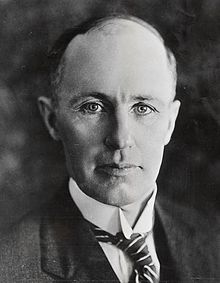Arthur Meighen | |
|---|---|
 Meighen c. 1920s | |
| 9th Prime Minister of Canada | |
| In office June 29, 1926 – September 25, 1926 | |
| Monarch | George V |
| Governor General | The Lord Byng of Vimy |
| Preceded by | W. L. Mackenzie King |
| Succeeded by | W. L. Mackenzie King |
| In office July 10, 1920 – December 29, 1921 | |
| Monarch | George V |
| Governors General |
|
| Preceded by | Robert Borden |
| Succeeded by | W. L. Mackenzie King |
| Leader of the Conservative Party | |
| In office November 12, 1941 – December 9, 1942 | |
| Preceded by | Richard Hanson (interim) |
| Succeeded by | John Bracken |
| In office July 10, 1920 – September 24, 1926 | |
| Preceded by | Robert Borden |
| Succeeded by | Hugh Guthrie (interim) |
| Leader of the Government in the Senate Minister Without Portfolio | |
| In office February 3, 1932 – October 22, 1935 | |
| Prime Minister | R.B. Bennett |
| Preceded by | Wellington Bartley Willoughby |
| Succeeded by | Raoul Dandurand |
| Canadian Senator from Ontario | |
| In office February 3, 1932 – January 16, 1942 | |
| Nominated by | R.B. Bennett |
| Appointed by | Earl of Bessborough |
| Minister of the Interior Superintendent-General of Indian Affairs | |
| In office October 12, 1917 – July 10, 1920 | |
| Prime Minister | Robert Borden |
| Preceded by | William James Roche |
| Succeeded by | James Alexander Lougheed |
| Solicitor General of Canada | |
| In office June 26, 1913 – October 3, 1917 | |
| Prime Minister | Robert Borden |
| Preceded by | vacant |
| Succeeded by | Hugh Guthrie (acting) |
| Member of the House of Commons of Canada | |
| In office January 26, 1922 – September 14, 1926 | |
| In office October 26, 1908 – December 6, 1921 | |
| Personal details | |
| Born | June 16, 1874 Anderson, Ontario, Canada |
| Died | August 5, 1960 (aged 86) Toronto, Ontario, Canada |
| Resting place | St. Marys Cemetery, St. Marys, Ontario |
| Political party | Conservative (1908–1917, 1922–1942) Unionist (1917–1922) Progressive Conservative (1942–1960) |
| Spouse |
Jessie Isabel Cox (m. 1904) |
| Children | Theodore Meighen Maxwell Meighen Lillian Meighen Wright |
| Relatives | Michael Meighen (grandson) |
| Education | University College, Toronto (BA) |
| Signature |  |
Arthur Meighen PC QC (/ˈmiːən/ MEE-ən; June 16, 1874 – August 5, 1960) was a Canadian lawyer and politician who served as the ninth prime minister of Canada from 1920 to 1921 and from June to September 1926. He led the Conservative Party from 1920 to 1926 and from 1941 to 1942.
Meighen was born in St. Marys, Ontario. His family came from County Londonderry, Ireland. He studied mathematics at the University of Toronto, and then trained to be a lawyer. After qualifying to practise law, he moved to Portage la Prairie, Manitoba. Meighen entered the House of Commons of Canada in 1908, and in 1913 was appointed to the Cabinet of Prime Minister Robert Borden. Meighen prominently served as solicitor general, minister of the interior, and superintendent-general of Indian affairs.
In July 1920, Meighen succeeded Borden as Conservative leader and prime minister – the first born after Confederation. Meighen suffered a heavy defeat in the 1921 election to Mackenzie King and the Liberal Party. Meighen lost his seat but re-entered Parliament through a 1922 by-election and remained Opposition leader. In the 1925 election, the Conservatives won a plurality of seats, just eight short of a majority government, but Mackenzie King decided to hold onto power with the support of the Progressive Party. Meighen's brief second term as prime minister in 1926 came about as the result of the "King–Byng Affair," being invited to form a ministry after Mackenzie King was refused an election request and resigned. He soon lost a no-confidence motion, however, and faced another federal election. Meighen lost his own seat, and the Conservatives lost 24, as Mackenzie King's Liberals re-took power.
After losing the 1926 election, Meighen resigned as party leader and quit politics to return to his law practice. He was appointed to the Senate in 1932, and under Prime Minister R. B. Bennett served as leader of the Government in the Senate and minister without portfolio until 1935. In 1941, Meighen became leader of the Conservatives for a second time, following Robert Manion's resignation. Meighen unsuccessfully attempted to re-enter the House of Commons in a by-election for York South and resigned as leader shortly thereafter. He returned to practising law afterwards.